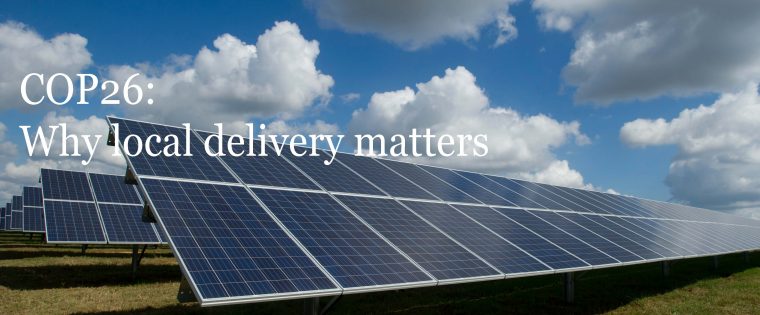COP26: Why Local Delivery Matters
Author: Grace Newcombe & Zayn Qureshi |

Meeting the net zero target is one of largest, most complex, and cross-cutting challenges that governments face. Many countries have committed to reaching net zero by 2050. To do so, governments must organise their policies for the major delivery challenge of net zero, unprecedented in both scale and speed required.
The challenge of reaching net zero firmly extends to local authorities who have a key role in supporting people, communities, and businesses through what must be a fair and just transition. Commitment to net zero runs throughout local government. COP26: Why Local Delivery Matters is a short research report stating the case for and barriers against local government as the delivery vehicle for decarbonisation.
Key points
The context: a just transition
Perhaps the most important, major opportunity of the transition to net zero the potential for huge net gains in total employment. This first point is of particular importance as there is a constantly expanding consensus that transitioning to greener economies can act as a strong driver of ‘job creation, social justice and poverty’. There is no ‘one size fits all’ approach for a just transiton, policy must be contextualised and designed in line with varying factors (such as skills sets, industry dependency, social cohesion, etc.). The context of a just transition is vital to understanding how local delivery impacts global chances of hitting climate targets.
The argument: a call for local action and representation
The vital role of local governments and the urgent need to actualise action on the local level cannot be ignored if national and, indeed, global net zero targets are to be met. Understandably, the discourse surrounding COP26 has focused on the global need for a seismic shift in the way countries around the world tackle the climate crisis. But a lack of coherent national strategy until now has had undesirable consequences on local government. And there are concerns that the new net zero strategy is simply a rehash of existing disjointed policy interventions. This is especially pertinent given the key role that action at the local level will play in delivering global COP26 and national net zero goals.
From citizens’ assemblies to climate emergency declarations, to local climate action plans, local authorities are presenting place-specific contributions towards achieving the national net zero target. The need for local nuance is particularly important given the varying levers available at the local level to prepare places for climate change. These are wide-ranging and include planning powers over buildings and transport, the responsibility to protect the local environment and wildlife, and duties over waste disposal. If done right, in strategic coordination with key stakeholders of the local state, there is vast potential to deliver a holistic green recovery from the pandemic that can aid in a just transition of the local labour market whilst moving at pace to decarbonise the economy.
The way forward: realising a whole systems approach
Local authorities have raised the issue of lack of coordination across government due to departments’ different requirements. This is due to separate and different arrangements of each department in liaising with local authorities on net zero issues and is further complicated where net zero implications cut across several departments. Local authorities lack the power to bring together spending trickling down from government with the broader plan for net zero in a local area. Additionally, funding to support climate change actions is often competitive and short-term – to embed net zero, councils need 10 to 20-year plans to reconceptualise, replan and rebuild.
This lack of coordination holds particular significance where reskilling the workforce for a green, low carbon economy will reduce unemployment in areas hit hardest by the pandemic . It has been estimated that there could be nearly 700,000 direct total jobs in England’s low-carbon and renewable energy economy by 2030 and more than 1.2m by 2050, generated across England’s local authorities. Allowing local authorities to take a holistic, ‘whole systems’ approach where targeted and localised measures are able to be carried out at scale as part of an overarching strategy is key to ensuring a just transition to net zero carbon emissions.
